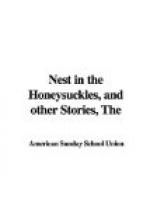Mrs. Dudley told them what it was, and that if they preserved it, they would in a few days see a butterfly escape from it. Eddie looked up astonished. She also told them that it was once a worm, crawling about upon the earth; that it had climbed up, and suspended itself under the shelter of the leaves, to await its change into a new and more attractive form of being.
Mrs. Dudley took the chrysalis from the vine and carried it to the house, and put it on the mantle in her room. Every day the children looked at it to ascertain if there was any change. Soon the colour began to fade, and the delicate pea-green became an ashen white. Then it opened slightly, where there had from the first seemed to be lines of division, and they could peep in at the imprisoned insect. The opening became wider and wider, and one day, when Eddie came into the room and went as usual to look at the chrysalis, the shell was empty! The butterfly had escaped. He uttered an exclamation of mingled surprise and disappointment. As he turned his head, he saw, on the little cotton muff of Mary’s doll, the butterfly for which he had so patiently watched.
“Here it is, mother!” he shouted in the most joyous tones, and his eyes sparkled with delight.
Eddie and his mother observed it for some time. Its long, slender legs rested on the muff, and ever and anon it would open and close its brilliant wings, as if to try their power, or to dry the miniature feathers which adorned them. Its colour was a rich orange, shaded from the lighter tints to the deeper, and variegated with stripes of black. The children examined it with a microscope, which made it appear even more beautiful and wonderful than before.
It remained on the muff several hours, and then flew to the window, and alighted on the curtain. At evening, it was found on the cushion of a spool-stand, and there it passed the night. The next day it disappeared, and the children saw it no more. It probably flew away through the open window, to enjoy its brief life under the smiling sun.
The children talked much about the transformations which had taken place in the life of that caterpillar. Their mother told them that the butterfly was sometimes considered a type of immortality. In this world we are, like the worm, in an inferior state of existence. Our bodies are laid in the grave, but we are not dead, any more than the unmoving chrysalis—which remained so long on the mantel just where it was placed—was dead. The spirit still lives, and, after it has freed itself from the imprisoning flesh, is more beautiful than before, and is susceptible of more perfect enjoyment in the pure atmosphere of heaven.
CHRISTMAS AT THE COTTAGE.
Mrs. Dudley’s children look forward to Christmas with many anticipations of pleasure, for several weeks before it comes. They are quite busy in preparing for it. Their mother is the repository of their secrets, and assists them by her advice in making their arrangements. Many important deliberations take place about mats, pin-cushions, and bookmarks.




